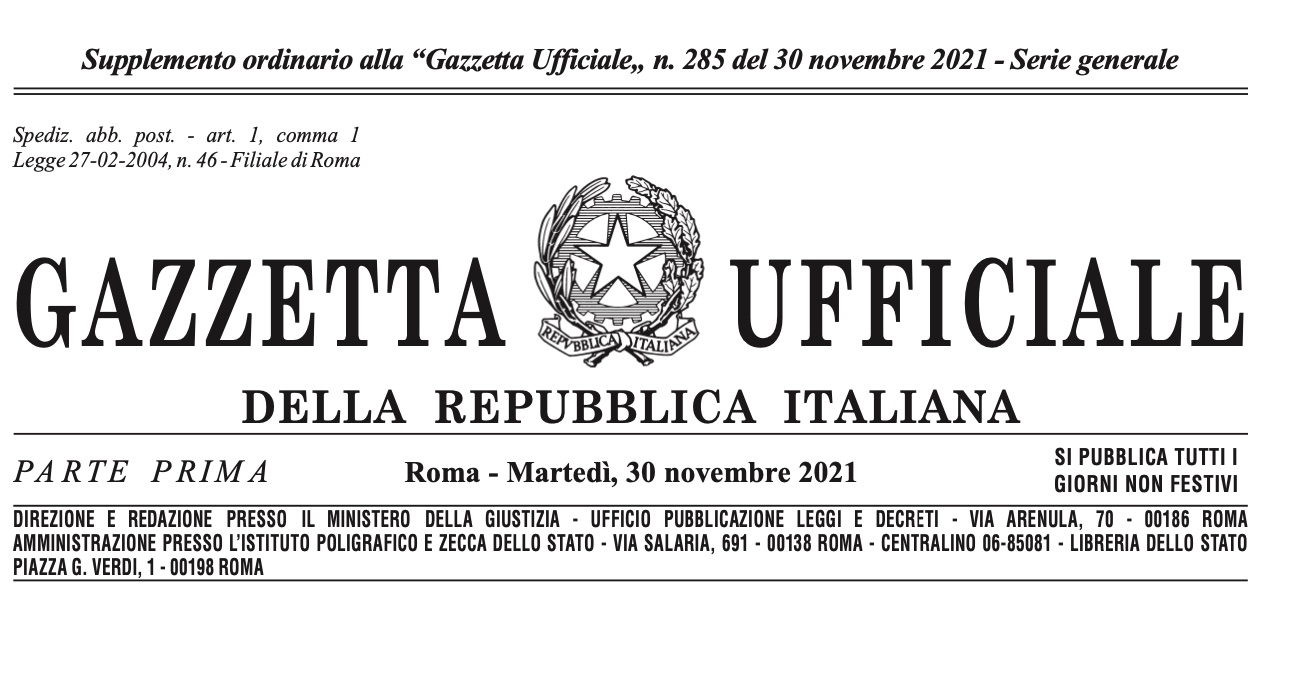Main news introduced by the transposition of EU Directive 2018/2001 into the Italian legal system
ART. 39
(Use of energy from renewable sources in the transport sector)
In order to promote the production of energy from renewable sources in the transport sector, in accordance with the trajectory indicated in the PNIEC, individual suppliers of gasoline, diesel, and methane are obliged to achieve a share of at least 16% of renewable sources on the total of fuels released for consumption in the reference year and calculated on the basis of the energy content.
The quota is reached in compliance with the following constraints:
a) the quota of advanced biofuels and biomethane or advanced biogas is at least 2.5 % from 2022 and at least 8 % in 2030;
b) the contribution of biofuels and biomethane or biogas produced from raw materials listed in Annex VIII, part B, may not exceed 2.5 % of the energy content of transport fuels without taking into account the multiplying factor referred to in paragraph 6, letter a);
c) the provisions of Article 40 are respected;
d) starting from 2023, the share of biofuels blended with gasoline is at least 0.5 % and starting from 2025 it is at least equal to 3% of the total gasoline released for consumption.
ART. 40
(Specific rules for biofuels, bioliquids and biomass fuels obtained from food and forage crops)
1. For the purposes of achieving the objective referred to in Article 3 and Article 39, paragraph 1:
a) the share of biofuels, bioliquids and biomass fuels consumed in transport, when produced from food or fodder crops, must not exceed more than one percentage point the share of such fuels in final energy consumption in the road and rail sectors in 2020 ;
b) without prejudice to the provisions of letter c), the quota of biofuels, bioliquids and biomass, all produced from food or fodder crops, which are classified as having a high risk of indirect change in the intended use of land with deed delegate of the European Commission, and for which a considerable expansion of the production area towards land with high carbon stocks is observed, must not exceed the total level of consumption of these fuels recorded in 2019. By decree of the Ministry of Ecological Transition, from be issued within one hundred and eighty days from the adoption of the aforementioned delegated acts, the linear decrease trajectory of this limit is identified until it reaches zero by 31 December 2030. The limit does not apply with reference to biofuels, bioliquids and biomass fuels certified to low risk of indirect land use change in accordance with the relevant delegated act of the European Commission;
c) from 2023 the share of biofuels and bioliquids, as well as biomass fuels, produced from palm oil, empty palm oil fruit bunches and fatty acids deriving from the treatment of oil palm fruits (PFAD) is not counted, unless they are certified as biofuels, bioliquids or biomass fuels with a low risk of indirect change of land use, in compliance with the criteria set out in article 4 of the European Commission Delegated Regulation (EU) 2019/807.
2. All the fuels referred to in letter c) of paragraph 1 cannot benefit from any support measures, with the exception of fuels certified pursuant to the same paragraph 1, letter c)
ART. 41
(Other provisions in the transport sector)
1. By decree of the Ministry of Ecological Transition, issued, within one hundred and eighty days from the establishment of the European Union database for the traceability of liquid and gaseous transport fuels referred to in Article 28, paragraph 2, of the Directive (EU ) 2018/2001, the procedures for participation in the same database by national institutions and interested parties are established. In particular, adequate forms and procedures for checking the truthfulness of the information entered in the database by private parties are envisaged, and adequate reporting tools for irregularities and data that do not correspond to the truth.
ART. 42
(Sustainability and greenhouse gas emission reduction criteria for biofuels, bioliquids and biomass fuels)
12. The use of biofuels, bioliquids and biomass fuels ensures a reduction in greenhouse gas emissions, calculated in accordance with Article 44, of at least:
The greenhouse gas emission savings from the use of biofuels, bioliquids and biomass fuels taken into account for the purposes referred to in paragraph 1 shall be:
- (a) at least 50 % for biofuels, biogas consumed in the transport sector, and bioliquids produced in installations in operation on or before 5 October 2015;
- (b) at least 60 % for biofuels, biogas consumed in the transport sector, and bioliquids produced in installations starting operation from 6 October 2015 until 31 December 2020;
- (c) at least 65 % for biofuels, biogas consumed in the transport sector, and bioliquids produced in installations starting operation from 1 January 2021;
- (d) at least 70 % for electricity, heating and cooling production from biomass fuels used in installations starting operation from 1 January 2021 until 31 December 2025, and 80 % for installations starting operation from 1 January 2026.
ART. 43
(Verification of compliance with the sustainability criteria and the reduction of greenhouse gas emissions)
1. To ensure compliance with the provisions of Articles 39 and 42, each batch of biofuels, bioliquids, biomass fuels, liquid or gaseous fuels of non-biological origin, fuels deriving from recycled carbon are certified. To this end, all economic operators belonging to the production chain adhere to the national sustainability certification system or a voluntary certification system.
2. The national sustainability certification system guarantees:
a) that all economic operators belonging to the production chain provide the information that contributes to demonstrating compliance with the sustainability criteria and the emission reduction criterion, as well as all the information required by the decree governing the national certification system referred to in Article 42, paragraph 15;
b) an adequate level of independent third-party verification of the information submitted for:
1) ascertain that the systems used by economic operators are accurate, reliable, and fraud-proof, also assessing the frequency and sampling method used and the solidity of the data;
2) verify that the materials have not been intentionally modified or discarded so that the batch or part of it could become a waste or residue.
6. The Ministry of Ecological Transition, also making use of the Committee referred to in Article 39, paragraph 10, checks the functioning of the certification bodies that carry out independent audits as part of a voluntary system. The certification bodies shall transmit, upon request of the Ministry of Ecological Transition, all relevant information necessary to check the operation, including the exact date, time, and place of the checks. In cases of non-compliance are ascertained, the Ministry of Ecological Transition informs the voluntary system without delay.
7. For the purposes of recognizing the increases in the energy contribution provided for in Article 39, paragraph 6, economic operators provide the information that contributes to demonstrating compliance with the sustainability and saving criteria for greenhouse gas emissions, respecting the following criteria:
a) adhere to the national certification system
b) in the biofuel production process that accrues recognition of the increase, the raw materials and biofuel at the end of the production process must be actually used as fuel;
c) the mixing of raw materials for the production of biofuels is not allowed between materials that can benefit from the increase with raw materials aimed at the production of biofuels that cannot benefit from this increase in all phases of the biofuel production chain preceding the perimeter identified as the final transformation process of these materials into biofuels.
8. Information on the geographical origin and type of raw materials of biofuels, bioliquids, and biomass fuels by fuel supplier is published on the GSE website on an annual basis.
9. The certifications referred to in paragraph 1, issued before the date of entry into force of this decree, remain valid provided that the batches to which they refer are released for consumption or used within twelve months from the date of entry into force of this decree. The certifications referred to in paragraph 1, issued before the entry into force of this decree and after the entry into force of the directive (EU) 2001/2018 that use the parameters contemplated therein, remain valid without the aforementioned time limit.
ART. 44
(Calculation of the greenhouse gas impact of biofuels, bioliquids and biomass fuels)
1. The reduction of greenhouse gas emissions deriving from the use of biofuels, bioliquids, and biomass fuels is calculated in one of the following ways:
a) whether Annex VI, Part A or B, for biofuels and bioliquids, and Annex VII, Part A for biomass fuels, set a standard value for the reduction of associated greenhouse gas emissions to the production chain and if the value for these biofuels or bioliquids calculated according to Annex VI, part C, point 7, and for biomass fuels calculated according to Annex VII, part B, point 7, is equal to or less than zero, said standard value is used;
b) the real value calculated according to the methodology defined in Annex VI, part C, for biofuels and bioliquids, and in Annex VII, part B for biomass fuels, is used;
c) a value resulting from the sum of the factors of the formulas set out in Annex VI, part C, point 1 is used, when the disaggregated default values set out in Annex VI, part D or E, can be used for some factors and actual values calculated according to the methodology defined in Annex VI, Part C, are used for all other factors;
d) a value resulting from the sum of the factors of the formulas set out in Annex VII, part B, point 1 is used, where the disaggregated default values set out in Annex VII, part C can be used for some factors and the actual values calculated according to the methodology defined in Annex VII, part B, they are used for all other factors.



